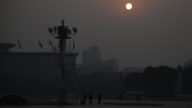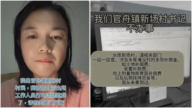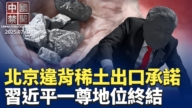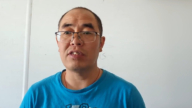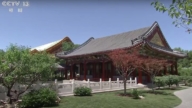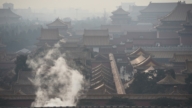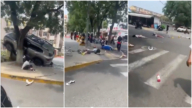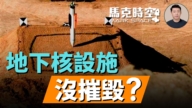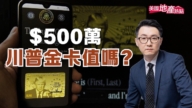【新唐人2013年11月09日讯】中共三中全会很快就要召开,中共喉舌不断放风,中共将进行全面经济改革。外界认为,30多年前,当中共面临生存危机时,中共开始的跛足改革, 已经把中国和中共本身带入到现在这种矛盾无解的境地,中共新政试图再次在加强共产党政治和意识形态控制的同时,进行由市场驱动的全面经济改革,对延续中共残喘的梦想将事与愿违。
最近中共媒体大势渲染,在9号召开的中共三中全会上,中共领导人习近平将罗列出一套全面的经济改革计划。他们想要通过鼓励更多的市场竞争、私营企业、金融自由化和个人消费来推动经济发展。试图在加强共产党政治和意识形态控制的同时,进行由市场驱动的全面经济改革。
美国南卡罗莱纳大学艾肯商学院教授谢田:“政治抓紧、经济放松,恰恰是造成中国社会经济今天这个状况的根源,现在看来,中共提出的所谓的解决方式,仍然是继续保持政治上的高压,和经济上的放活,这条路是没有出路的,实际上是死路一条。”
20世纪70年代末,“文革”结束后,中国经济濒临崩溃。面对东欧共产党国家大规模罢工和动荡,中共政权也面临严重的生存危机。时任中共领导人的邓小平,开始了以国家支持和市场机会混合驱动下的改革。然而在这种强调以坚持共产党的领导,以国家为中心的权力体制中,庞大的官僚机构、国有集团和共产党的寡头,获得了巨大的财富和权力,造成中国的两级分化严重。各地抗争,维权运动此起彼伏。
伴随经济快速发展而带来的是令人窒息的污染、地方政府债台高筑、低效而腐败的垄断,户口和土地所有制度,则让农村居民难以分享这个国家围绕城市发展而取得的繁荣。
现在,中共领导人习近平和李克强,虽然声称三中全会的改革,将从以国家为中心转到以市场为中心,不过习近平强化中共的领导一以贯之,而中共的权力和财富,以及它的执政合法性恰恰都来自于它在经济中发挥的广泛作用。专家质疑,习近平即将把这个国家和他自己推入一场有风险的实验。
曾担任中共领导人助手、参与了20世纪80年代中国市场改革的吴伟指出,如果不从政治层面上解决问题,这些经济改革措施都会半途而废。
时事评论员汪北稷:“中共现在走入的一个怪圈就是,只想发展经济不想发展权利,是走不通的,一旦经济意识上升,人们的自由、货币增加,他会去出国去旅行,看到国外的警察比较和蔼,看到国外的空气好,水好,回去又很痛恨中共,所以中共整体上意识不到,它的发展方向和它的目标是冲突的。”
近来中共大量讨论安全问题,把安全问题从国家安全,逐步转移到政权安全和意识形态安全。中共学者们认为,政治安全既是国家的主权安全,而政治制度、和执政党执政活动、以及意识形态的安全尤为重要。
美国纽约城市大学政治学教授夏明:“从国家安全到政体安全,最后到意识形态安全,一方面反映了中共的惶恐和不安,认识到它的政权面临着崩溃和瓦解的危险越来越增加,现在习近平已经把中国共产党的重点从经济建设转移到捍卫意识形态安全。”
据中共喉舌总结,自1978年,中共首度开始改革开放以来,农村农业、市场经济、改革发展成为出现频率最高的关键词,改革在中共历次三中全会的公报中,出现达116次之多。
美国“纽约城市大学”政治学教授夏明指出,中共其实是在利用国家权力的同时,把市场经济作为手段,为中共的寡头、官员攫取财富,掠夺人民。而引进外资则和中国的廉价劳动力,两厢结合,又给中共维持权利提供了一个新的剥夺机会。
采访编辑/刘惠 后制/黎安安
Chinese Regime Third Plenary Dilemma: Save The Party or Reform
The Chinese Communist Party
(CCP) Third plenary is approaching.
Chinese state-controlled media began
highlighting proposed economic reforms.
Our experts believe that failed reforms 30 years
ago, when the CCP was at the eve of collapse, has
brought China and the CCP to this hopeless end.
Another reform under the current regime ideology,
with tyrannical control as priority, is doomed to fail.
Chinese state media reported on comprehensive economic
reforms that Xi Jinping will lead during the Third Plenum.
It is an idea to promote economic development, by
encouraging market competition, private businesses,
financial liberalization and more consumer activity.
It hopes to strengthen the regimes political
and ideological control, while conducting
comprehensive market-driven economic reforms.
Xie Tian, Professor at School of Business, University
of South Carolina Aiken: “Tightly grasping politics,
and relaxing the economy, are exactly the causes
of the current society and economy in China today.
The so-called reforms appear
to be taking the same approach.
Tight political pressure and a relaxed economy
is going nowhere, and it’s a dead end."
After the Cultural Revolution in the 70’s,
China’s economy nearly collapsed.
During the time period when Eastern European communist
countries faced massive protests and unrest, the CCP
was also facing a serious crisis for it’s own survival.
Then leader Deng Xiaoping began reforms, where were
driven by national support and market opportunities.
The CCP, central leadership, state power,
and state-owned enteprises became a
source of enormous wealth and power.
Severe differentiation, protests, and rights
movements are thus all over in China.
Rapid economic development is accompanied
by suffocating pollution, huge local government
debts, inefficient and corrupt monopolies,
and failing household and land systems.
Consequently, rural residents are marginalised
from the prosperity of the neighboring cities.
Current leaders Xi Jinping and Li Keqiang claim
that reforms in the Third Plenum will turn the
system from state-centered to market-centered.
Xi is insistant that the CCP leadership remains.
However, the power and wealth of the CCP and
its continued rule rely on the functioning economy.
Experts suspect Xi Jinping is leading the
country and his rule into a risky experiment.
Wu Wei is a former researcher at the Office of
Political Reform of the CCP Central Committee.
Wu also served as Secretary to the office’s director.
Wu indicated that in not solving problems
at the political level , these economic reform
measures will only end up failing half way.
Wang Beiji, political commentator: “The CCP is in
a vicious cycle of allowing economic development,
but not rights development, and its not going to work.
Once the economy improves, people are move more freely.
They may go abroad, and realize that policing is
more friendly, the air is fresher, and the water is better.
They will being to hate the CCP.
The CCP itself could not understand that its
development policies and goals are conflicting."
Recently, the CCP has focused on security issues.
These range from national security to
regime security and ideological security.
CCP scholars believe that political
security is a sovereign security.
Therefore, security in the political system, the ruling
party activities, and ideology is particularly important.
Xia Ming, Political Science Professor, City University
of New York: “From National Security, security for
the regime, and finally to ideological security, it
is only a reflection of the CCP’s fear and anxiety.
They recognize the regime is
facing collapse and disintegration.
Xi Jinping is shifting focus from economic
construction to defending ideological security."
Chinese state-media summarized that since 1978,
when the CCP first opened up and initiated reforms, rural
agriculture, market economy, and reform and development,
have become the most frequently occurring key words.
Reform has been mentioned 116 times
in previous communiqué of the Plenum.
Xia Ming suggests that the CCP manipulates state
power with a market economy to accumulate
wealth for officials and to rob the Chinese people.
Foreign investment, at the cost of the cheap labor in
China, has provided new opportunities for deprivation.
Interview & Edit / Liu Hui Post-production



